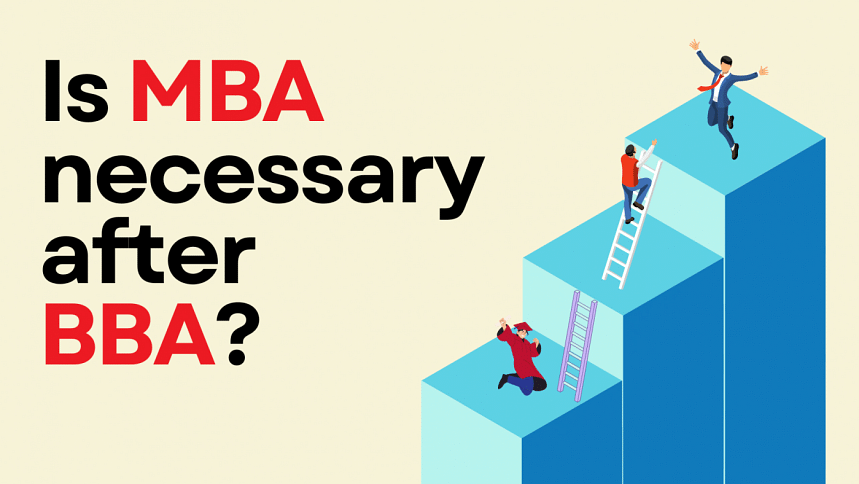Is MBA necessary after BBA?

Compared to most other avenues of learning we now have at our disposal, formal education is a rather expensive one. But the purpose of a professional degree like an MBA can be more than learning. It is a credential that sets one ahead in the workplace. Or does it? What is required and rewarded in the modern workplace is constantly evolving. So, whether or not MBA is needed after BBA depends on how fittingly MBA delivers the additional capabilities and credentials that a BBA degree can't fulfil.
It's not uncommon for business graduates in our country to enrol in a job right after completing their BBA. It is so because a BBA degree suffices for the entry level jobs in both local and multinational corporations. Management Trainee programs, which are entry level jobs with intensive training and fast career growth, also require no more than a BBA degree in terms of formal education.
Though entry level jobs do not ask for an MBA, how important it is for senior positions is something worth delving into.
Mosharraf Khan Yaafi, the Chief Operating Officer at PFEC Global, did his MBA seven years after completing his BBA.
"It was the late 2000s, even before the social media revolution, when I did my MBA. At that time, top management used to think that someone must have a Masters' degree to be able to handle top tier positions," he said.
But a lot has changed since then. Apart from the financial sector, the perception of MBA or a Masters' degree being a requisite or advantage is less prevalent nowadays.
From his years of experience in the corporate sector, where he has often contributed to hiring and promotion decisions too, Mosharraf Khan Yaafi tells us, "Strong analytical skills, firm decision-making capacity, sharpness, maturity, business acumen, and the ability to demonstrate knowledge and skill on a given assignment matters more than the highest level of university degree."
Right after BBA, opting for professional certifications instead of MBA is also an option worth considering, especially for people who intend to build a career in finance.
Nusrat Sharmin Moutusi, Senior Finance Business Partner at Unilever, got the Associated Chartered Accountants (ACA) certification from Institute of Chartered Accountants in England and Wales (ICAEW) after BBA. She started working in the United Kingdom and later moved to Bangladesh but never went back to school for an MBA.
When asked if she plans to do an MBA in the future, she replied, "I have returned from the UK to Bangladesh to stay in the country and an expensive MBA won't add any extra value to my career here. I already am a qualified Chartered Accountant working in a leadership position with ten years of experience. So, unless I want to move to North America for some reason, it won't add much value."
A full-time MBA usually requires one to two years. These are years that could have been spent gaining work experience. So, the trade-off between professional experience and academic credentials should be kept in mind before choosing to do an MBA. In the context of the current Bangladeshi job market at least, gaining work experience instead of doing an MBA right after BBA can turn out to be more helpful. But is this to say that MBA is redundant after BBA?
Despite the similarity between the content covered in BBA and MBA, students get the opportunity to compare the theoretical knowledge with the real business world if they opt for an MBA after gaining a few years of work experience.
Mohammad Sakib Khaled belongs to the portion of BBA graduates who choose to work in the development sector. He has worked in several development projects in Bangladesh during his tenure in Swisscontract and International Development Enterprise (iDE). How important is MBA for BBA graduates working in the development sector?
For him, "an MBA degree, especially one from a top business school, can be a fantastic means to build a solid network."
Sakib personally didn't do an MBA. Instead, he is currently pursuing his Master's in Globalisation, Business and Development from the University of Sussex.
"I realised that some academic understanding of relevant development approaches, theories, and debates would help me strengthen my experience with a theoretical underpinning which I would not get from an MBA. Moreover, specialised Master's and PhD degrees are valued higher than MBA degrees in the development sector, both globally and locally, due to the knowledge-intensive nature of the work done in this field," he said.
A specialised Master's instead of an MBA might be an option worth considering even for those who are not into the development sector. Nusrat Sharmin Moutusi, who previously mentioned of her plans to not go for an MBA, said, "I might do a Master's on data science or data analytics, something very different from my field of work and early education, mostly out of passion and to get an in-depth knowledge on the subject matter."
Given the huge role data is playing in the world right now, a Master's in data science instead of MBA is increasingly becoming popular as BBA doesn't aptly equip one with data related skills.
BBA graduates are also increasingly getting involved with startups. How an MBA degree plays out in the dynamic work environment of startups is an interesting question.
We sought the opinion of Sibbir Riyan, who recently completed his BBA and is currently working as a Product Marketing Manager at IdeaScale, an innovation management software platform. He said, "In today's startup culture, it's less about credentials and more about the raw display of skills, delivering successful projects, and exceeding expectations above and beyond. I've rarely come across anyone with an MBA in the US and Bangladeshi startup scene; those who have one, they don't necessarily attribute their success to the degree."
The perception of a BBA degree eventually being followed by an MBA at some point is changing. The core knowledge imparted in the two degrees are very similar. But doing an MBA after a few years of job experience helps in interpreting the material through the lens of the real business world. A few years in the job market also helps in deciding whether an MBA or a specialised Master's will be better in achieving one's professional and personal learning goals.
The most important question to answer is this: what is the best fit given one's own personal career trajectory? The answer might be an MBA, some other professional certification, a specialised Master's or even just a BBA degree.
Noushin Nuri is a student of the Institute of Business Administration, University of Dhaka

 For all latest news, follow The Daily Star's Google News channel.
For all latest news, follow The Daily Star's Google News channel. 








Comments